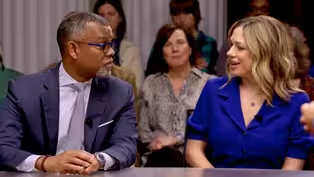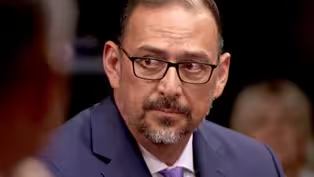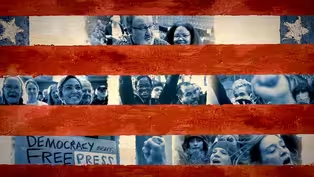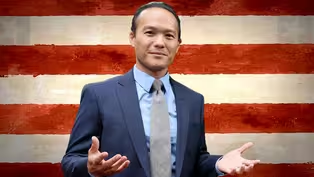
How to Save a Democracy
Clip: 9/20/2024 | 3m 54sVideo has Closed Captions
What can and should we do differently as we approach the upcoming elections?
A panel of experts discusses what we—politicians, journalists, and citizens—can and should do differently as we approach the upcoming elections. ‘DEADLOCK: An Election Story’ encourages civil dialogue and critical thinking in an era dominated by polarizing debates.
Problems playing video? | Closed Captioning Feedback
Problems playing video? | Closed Captioning Feedback
Funding for this program was provided in part by grants from The Rosalind P. Walter Foundation and by a grant from Anne Ray Foundation and by contributions from viewers like you. Thank you. Location furnished by The New York Historical.

How to Save a Democracy
Clip: 9/20/2024 | 3m 54sVideo has Closed Captions
A panel of experts discusses what we—politicians, journalists, and citizens—can and should do differently as we approach the upcoming elections. ‘DEADLOCK: An Election Story’ encourages civil dialogue and critical thinking in an era dominated by polarizing debates.
Problems playing video? | Closed Captioning Feedback
How to Watch Breaking the Deadlock
Breaking the Deadlock is available to stream on pbs.org and the free PBS App, available on iPhone, Apple TV, Android TV, Android smartphones, Amazon Fire TV, Amazon Fire Tablet, Roku, Samsung Smart TV, and Vizio.
Buy Now
Providing Support for PBS.org
Learn Moreabout PBS online sponsorship- Folks, I have one last chapter of our story to unfold.
What would you say to all of us about what we can do differently to protect American democracy?
- We have to somehow step back from demonizing those we disagree with.
It used to be that the other guy had a bad idea.
Now the other guy is a bad guy, and you can't compromise with that.
We have to find a way to speak with one another again.
But first and foremost, we have to break this trap that we find ourselves in, of demonizing the other side.
- Learn to disagree without being disagreeable.
Respect each other's points of view as if their opinions matter just as much as yours.
This is the most durable, sustainable democracy, so long as we participate and respect our neighbors when we do so.
- But I think the stories we tell about our own democracy really matter.
But I do think that a narrative of democracy, that this was a stable working thing is not true.
I think this is like a narrative that has to become more complicated.
That it was always a work in progress, that it was always exclusionary, that it was always bigoted, that it was always violent, and that's hard.
And so I feel like when that story is told to expand out what America has been, it will be easier for us to see each other as working through a difficult experiment like the people who came before us.
- Our founding fathers were not infallible.
They were quite brilliant to forge basically outta iron, an entire new system of government for a society that thought only God appointed kings could make decisions.
They believed the people that we would vote and elect into positions of power would adhere to high ethical norms and standards.
- Look, our founding fathers created a system where state legislatures can do extraordinary things to control the electoral, how the electors vote.
But they also said that the system requires people to act with integrity.
All elected officials, all electors and all voters should act with integrity.
- I there's a small change to that 'cause the system doesn't say, it doesn't require that you act with integrity, it's unwritten.
Correct.
- This guy and I agree on almost nothing when it comes to elections in real life.
And yet in this hypothetical, which I think should serve as the example, we're willing to sit next to one another, participate, have the discussion, and have the conversation.
This is what America should look like.
Maybe more this than that, but it is...
This is what it's supposed to be about.
And while the art of governing is one thing, the art of campaigning ought to be seen as something we can compartmentalize, that we're not gonna take the viciousness of a campaign and those attacks that are seemingly inevitable and use those characterizations when we have to sit around and make decisions with one another.
We can do that without making judgments about one another.
And that's why actually walking in here, I was a little bit challenged.
Mr. Kobach and I have never actually met.
But if this is the way we're gonna start breaking the ice, then let's do it.
Navigating Election Day: Poll Watchers and Poll Workers
Video has Closed Captions
Clip: 9/20/2024 | 3m 10s | Learn about poll watchers and poll workers in this clip from DEADLOCK: an election story. (3m 10s)
When Disinformation Meets Social Media
Video has Closed Captions
Clip: 9/20/2024 | 4m 8s | What ethical actions should be taken when a fake video goes viral on social media? (4m 8s)
Video has Closed Captions
Clip: 9/20/2024 | 2m 16s | Violence could erupt at the polls, in this clip from ‘DEADLOCK: An Election Story.’ (2m 16s)
Video has Closed Captions
Preview: 9/20/2024 | 1m 14s | A panel of influential figures talks through ethical dilemmas based on a real-life scenario. (1m 14s)
Video has Closed Captions
Preview: 9/20/2024 | 31s | Experts explore ethical dilemmas, promoting constructive dialogue about polarizing issues. (31s)
Providing Support for PBS.org
Learn Moreabout PBS online sponsorship
- News and Public Affairs

Top journalists deliver compelling original analysis of the hour's headlines.

- News and Public Affairs

FRONTLINE is investigative journalism that questions, explains and changes our world.












Support for PBS provided by:
Funding for this program was provided in part by grants from The Rosalind P. Walter Foundation and by a grant from Anne Ray Foundation and by contributions from viewers like you. Thank you. Location furnished by The New York Historical.




